

My Keyoxide Idendity:
aspe:keyoxide.org:TJXAWXPMSAG6VPARJQRWNB2TPA
Hm ok but I also cannot login
The app is huge and "Loopless" is only available if you have a google account so...
XMRChat, Message and Tip with Monero - Alternative to Patreon, Ko-Fi, Liberapay etc.
Viewers, send messages and tips with ease and privacy. Streamers, keep nearly all of your tips instead of giving 30-50% to big tech.

I dont have an app, i use it through Mull. Javascript JIT is disabled
The desktop version uses Electron, a shitty Chromium + Node.js framework for devs that really only want javascript and web tech
Can someone else not log into loops? I have an account but clicking the login button does nothing
True, forgot about that.
Alternatively yeah some system to load the data online, autodelete after a while of not logging into something.
But the question really is "why?"
Disk encryption should deal with everything. Secure boot and usbguard are useful anyways.
THIS prevented you from switching?
Afaik screenshare always worked when using Discord in a browser
Which it isnt
Yeah because Flatpak firefox is damn insecure!
Please dont use it. Firefox devs dont care. Flatpak restricts browsers from spawning "user namespace" sandboxes for filesystem isolation.
Chromium uses a fork server (zygote) and breaks when it cannot spawn these sandboxes. So developers created zypak, which allows to isolate processes using bubblewrap, the Flatpak sandbox.
Firefox just runs without a sandbox, and doesnt have a fork server, so nobody cares.
Without process isolation, you have less duplicated content. THIS IS INSECURE.
Please use a non-Flatpak Firefox version.
There is no reason why a "Zen Browser" should use less RAM than Firefox.
Wow, what camera did you use to take this?
Blendee exists since 2002??
- use a non sudo user for the user
- somehow get the IP address of that laptop all the time. There are dynDNS solutions like this where the client just needs to automatically download a certain file daily and you know his IP, my implementation is here.
- have ssh access to root with a ssh key. The usual hardening, fail2ban, block using passwords
- open the port for ssh on the clients system
If something goes wrong, login via ssh (you know the dynamically changing IP) and remove a directory or the entire user.
You cannot avoid that a user would copy files from there to a usb stick. Well you could, by using usbguard. Works really well in my experience, just prevent nonsudo users from adding new devices.
And then you need to prevent the user from booting another system, or taking out the SSD and reading it. TPM and boot lock is the right thing here, what Max-P wrote.
Everything that does something is a file. No files, no existence ;)
All these "slam a triangle on top of an old building" things are fkn ugly though XD
like, modern, nice architecture why not.
Lol as a Fedora Discussion member, NVIDIA issues are there but like 10%
The death of clean energy in the USA? Not a chance! Here is why... (Just have a think)
YouTube Video
Click to view this content.
Using i2p on Android with Mull
Attached: 4 images How to use #i2p on #GrapheneOS, using #mull (#firefox) Only Firefox seems to be able to use a regular ol' HTTP proxy, on Android. Pretty crazy. 1. Install i2p, on Android you can use: - [I2P](https://github.com/i2p/i2p.android.base) - I2PD, [this F-Droid repo](https://fdroid.i2...
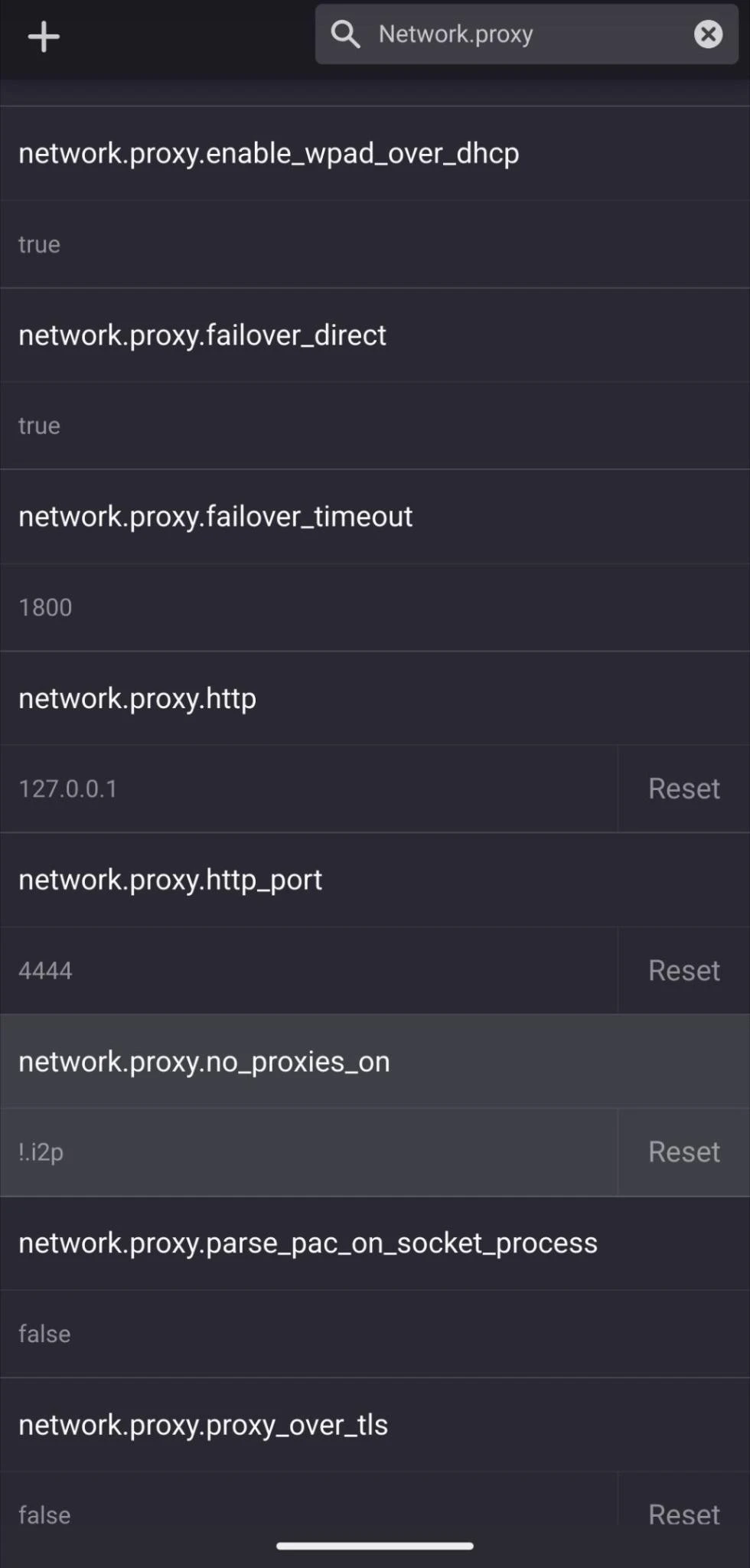
On Android/GrapheneOS, Firefox/Mull/variants is the only browser with the needed proxy settings to use with i2p.
After a bit of searching, it works very well!
As i2p servers you can use "i2p", "i2pd" (more minimal but more efficient) or "InviziblePro" which bundles some implementation of i2p.
I am using i2pd currently, and it works well.
Installed the apps with Obtainium
- Mull from the DivestOS F-Droid repo
- i2pd from the purplei2p F-Droid repo
- MullvadVPN from Github, Orbot from the guardianproject repo (as fallback if clearnet sites are used)
The browser can open .i2p and clearnet sites, using a little hack:
network.proxy.no_proxies_on to !.i2p
Use i2p on Android with Mull/Firefox
On Android/GrapheneOS, Firefox/Mull/variants is the only browser with the needed proxy settings to use with i2p.
After a bit of searching, it works very well!
As i2p servers you can use "i2p", "i2pd" (more minimal but more efficient) or "InviziblePro" which bundles some implementation of i2p.
I am using i2pd currently, and it works well.
Installed the apps with Obtainium
- Mull from the DivestOS F-Droid repo
- i2pd from the purplei2p F-Droid repo
- MullvadVPN from Github, Orbot from the guardianproject repo (as fallback if clearnet sites are used)
The browser can open .i2p and clearnet sites, using a little hack:
network.proxy.no_proxies_on to !.i2p
Using i2p on Android with Mull and i2pd
Attached: 4 images How to use #i2p on #GrapheneOS, using #mull (#firefox) Only Firefox seems to be able to use a regular ol' HTTP proxy, on Android. Pretty crazy. 1. Install i2p, on Android you can use: - [I2P](https://github.com/i2p/i2p.android.base) - I2PD, [this F-Droid repo](https://fdroid.i2...
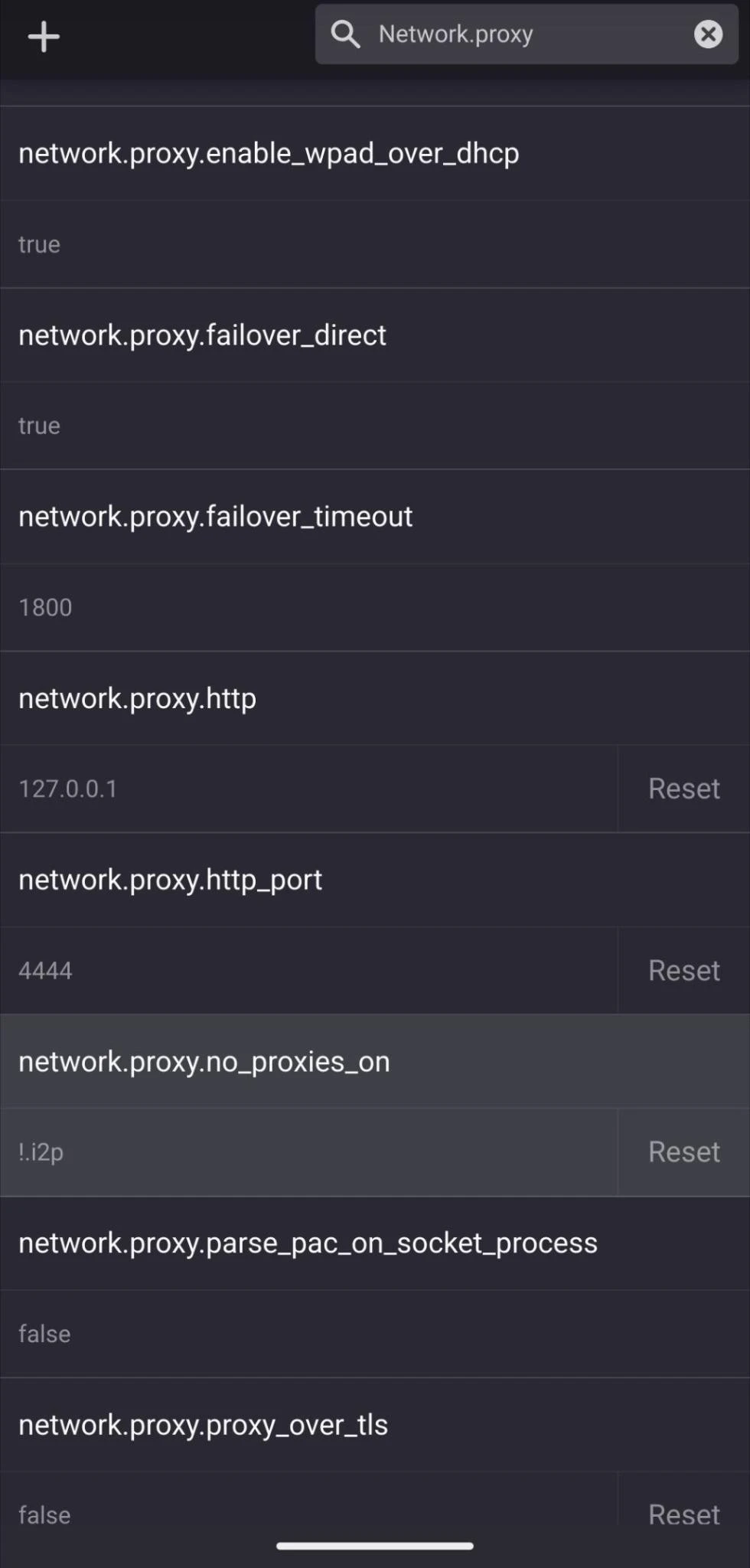
On Android/GrapheneOS, Firefox/Mull/variants is the only browser with the needed proxy settings to use with i2p.
After a bit of searching, it works very well!
As i2p servers you can use "i2p", "i2pd" (more minimal but more efficient) or "InviziblePro" which bundles some implementation of i2p.
I am using i2pd currently, and it works well.
Installed the apps with Obtainium
- Mull from the DivestOS F-Droid repo
- i2pd from the purplei2p F-Droid repo
- MullvadVPN from Github, Orbot from the guardianproject repo (as fallback if clearnet sites are used)
The browser can open .i2p and clearnet sites, using a little hack:
network.proxy.no_proxies_on to !.i2p
KDE Discover now shows verification status of Flatpak apps!

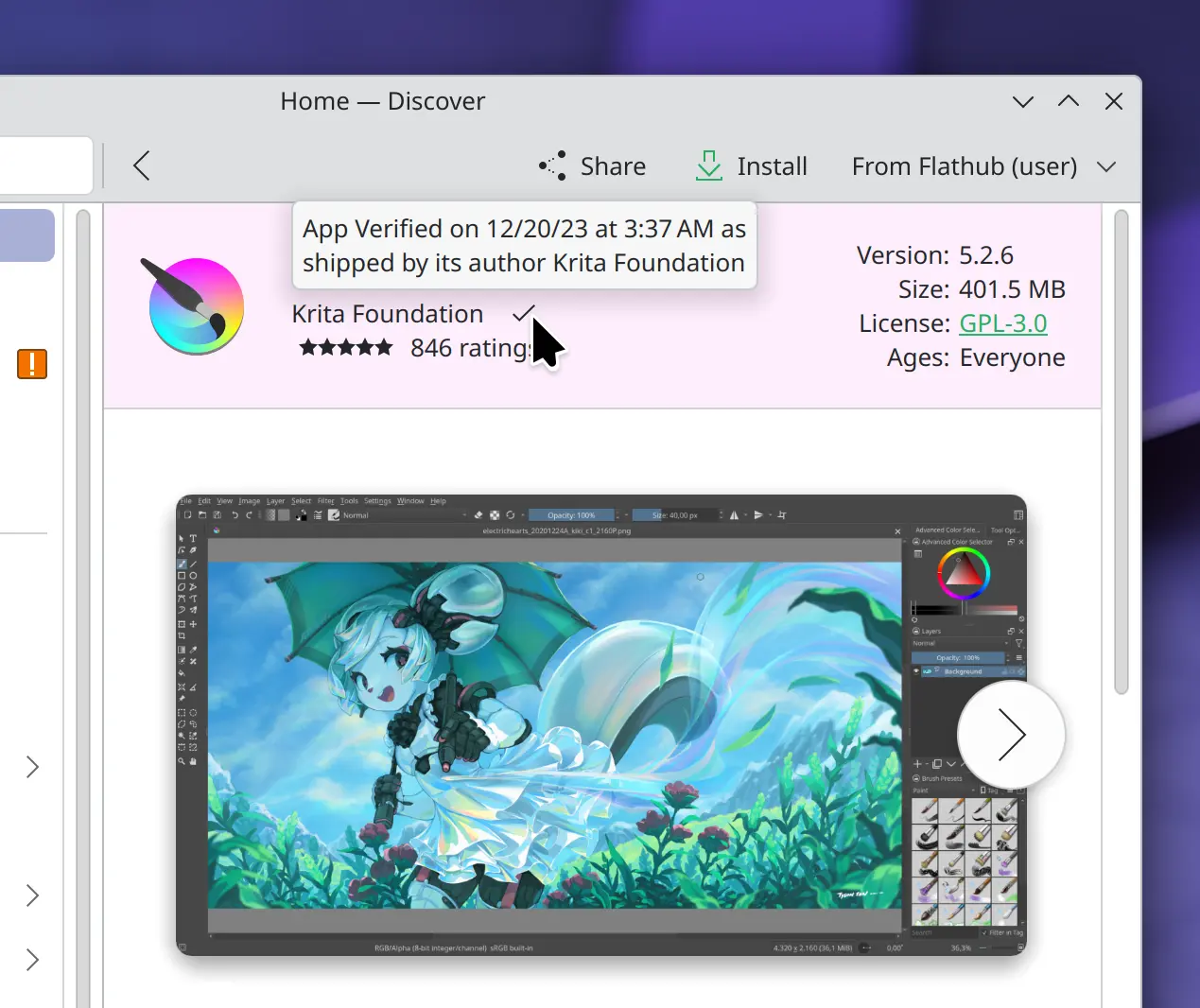
This is great. Having access to all apps is nice, but it is also useful to know how and if flatpak apps are verified.
This mostly means they are packaged by official developers. This guarantees better security, as the chain of trust is shorter, and better support.
Script to install Brave and Vivaldi variants on Fedora Atomic
A simple interactive script to install Brave (stable, beta, nightly) or Vivaldi on Fedora Atomic - boredsquirrel/browserscript-fedora-atomic

Easily install your favourite browsers on Fedora Atomic Desktops, Silverblue, Kinoite, uBlue, Bazzite, Aurora, Bluefin, Secureblue etc.
Getting a Nitrokey 3A work with usbguard
Using usbguard is pretty essential to protect against common attacks like malicious devices, rubber duckies, OMG cables or the “governmental 3 letter agency equivalents”. Especially thunderbolt (which can be blocked globally, see this config as to how can grant attackers access to your RAM, which m...

Getting a Nitrokey 3A work with usbguard on Fedora
Using usbguard is pretty essential to protect against common attacks like malicious devices, rubber duckies, OMG cables or the “governmental 3 letter agency equivalents”. Especially thunderbolt (which can be blocked globally, see this config as to how can grant attackers access to your RAM, which m...

Interview with Mark Shuttleworth, creator of Ubuntu

YouTube Video
Click to view this content.
The interview is in english
TIL
- Mark was a Debian contributor
- His goal was to make Linux succeed like Dropbox and Netflix
- He acknowledges how ChromeOS and Android (both newer than Ubuntu afaik) shaped the Linux Desktop
- ChromeOS uses upstart, the init system that Canonical created
- Canonical is smaller than SUSE
- Mark considers Ubuntu to be more open than Fedora because they have
flatpakin their repos (well, Snaps arent sandboxed outside of Apparmor, so that just makes sense I guess?) - Ubuntu kept in contact with GNOME while switching to Unity, so they could easily fall back
- Microsofted lured in Linux devs with money, to make licensed software
- The cloud department in Microsoft was pretty progressive, using Linux anyways
- Azurelinux is a competitor against Ubuntu
wayland-transpositor: display remote or virtualized windows on the host using Wayland - written in Rust
Contribute to wayland-transpositor/wprs development by creating an account on GitHub.
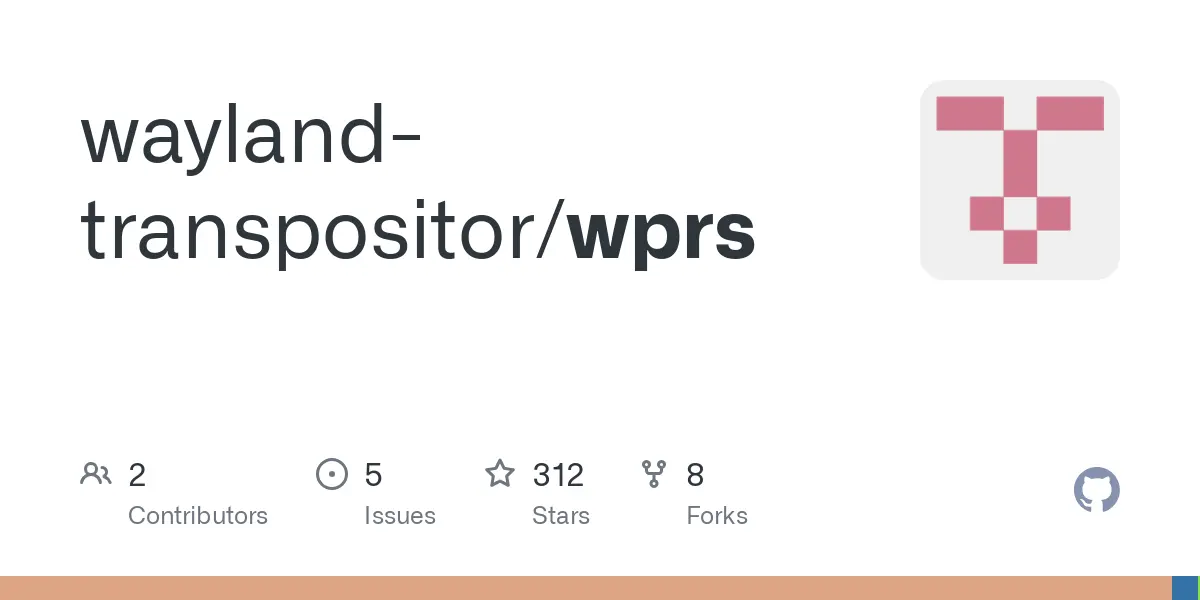
Contribute network location data to get location everywhere without sattelites!
Wie geht einfache schnelle Standortbestimmung überall,, auch in Gebäuden und ohne Satteliten? Hier hilft #NLP (network location position), also Standortbestimmung ohne #GPS oder #AGPS Mithilfe von Datenbanken kann dein Handy dir so sagen, wo du bist, aufgrund von umliegenden Mobilfunktürmen, WLan...
Opensource geodata of celltowers, wifis and bluetooth beacons is crucial.
It allows apps like UnifiedNLP to give the OS the location data it needs, without relying on GPS Sattelites.
GPS can be tampered with, and A-GPS is not privacy friendly at all.
UnifiedNLP is only found included in microG, which is pretty insecure.
But GrapheneOS devs are working on a regular user app that serves network location data, using Apple, Apple (proxied) or a local BeaconDB database!
BeaconDB is a new service to replace MozillaLocationServices which has shut down unfortunately.
Apps like TowerCollector dont yet support it, but NeoStumbler does, and also has more advanced features.
Collect network info in your region, and in the future you (and everyone else using it) dont need GPS anymore!
(You can also use the screenshots in that mastodon thread as reference)
Contribute network location data to get location everywhere without sattelites!
Wie geht einfache schnelle Standortbestimmung überall,, auch in Gebäuden und ohne Satteliten? Hier hilft #NLP (network location position), also Standortbestimmung ohne #GPS oder #AGPS Mithilfe von Datenbanken kann dein Handy dir so sagen, wo du bist, aufgrund von umliegenden Mobilfunktürmen, WLan...
Opensource geodata of celltowers, wifis and bluetooth beacons is crucial.
It allows apps like UnifiedNLP to give the OS the location data it needs, without relying on GPS Sattelites.
GPS can be tampered with, and A-GPS is not privacy friendly at all.
UnifiedNLP is only found included in microG, which is pretty insecure.
But GrapheneOS devs are working on a regular user app that serves network location data, using Apple, Apple (proxied) or a local BeaconDB database!
BeaconDB is a new service to replace MozillaLocationServices which has shut down unfortunately.
Apps like TowerCollector dont yet support it, but NeoStumbler does, and also has more advanced features.
Collect network info in your region, and in the future you (and everyone else using it) dont need GPS anymore!
(You can also use the screenshots in that mastodon thread as reference)
Contribute network location data to get location everywhere without sattelites!
Wie geht einfache schnelle Standortbestimmung überall,, auch in Gebäuden und ohne Satteliten? Hier hilft #NLP (network location position), also Standortbestimmung ohne #GPS oder #AGPS Mithilfe von Datenbanken kann dein Handy dir so sagen, wo du bist, aufgrund von umliegenden Mobilfunktürmen, WLan...
Opensource geodata of celltowers, wifis and bluetooth beacons is crucial.
It allows apps like UnifiedNLP to give the OS the location data it needs, without relying on GPS Sattelites.
GPS can be tampered with, and A-GPS is not privacy friendly at all.
UnifiedNLP is only found included in microG, which is pretty insecure.
But GrapheneOS devs are working on a regular user app that serves network location data, using Apple, Apple (proxied) or a local BeaconDB database!
BeaconDB is a new service to replace MozillaLocationServices which has shut down unfortunately.
Apps like TowerCollector dont yet support it, but NeoStumbler does, and also has more advanced features.
Collect network info in your region, and in the future you (and everyone else using it) dont need GPS anymore!
(You can also use the screenshots in that mastodon thread as reference)
Contribute network location data to get location everywhere without sattelites!
Wie geht einfache schnelle Standortbestimmung überall,, auch in Gebäuden und ohne Satteliten? Hier hilft #NLP (network location position), also Standortbestimmung ohne #GPS oder #AGPS Mithilfe von Datenbanken kann dein Handy dir so sagen, wo du bist, aufgrund von umliegenden Mobilfunktürmen, WLan...
Opensource geodata of celltowers, wifis and bluetooth beacons is crucial.
It allows apps like UnifiedNLP to give the OS the location data it needs, without relying on GPS Sattelites.
GPS can be tampered with, and A-GPS is not privacy friendly at all.
UnifiedNLP is only found included in microG, which is pretty insecure.
But GrapheneOS devs are working on a regular user app that serves network location data, using Apple, Apple (proxied) or a local BeaconDB database!
BeaconDB is a new service to replace MozillaLocationServices which has shut down unfortunately.
Apps like TowerCollector dont yet support it, but NeoStumbler does, and also has more advanced features.
Collect network info in your region, and in the future you (and everyone else using it) dont need GPS anymore!
(You can also use the screenshots in that mastodon thread as reference)
Coreboot install on an 8th Gen HP Chromebook
I got a HP Chromebook used, bought it to flash it and convert it into a nice secure Linux machine. The CPU is quite old and actively cooled, but the display is huge! Will become a nice workstation once a real OS is on there (go away Gemini). 1. Logging in normally I started it up normally. Logg...
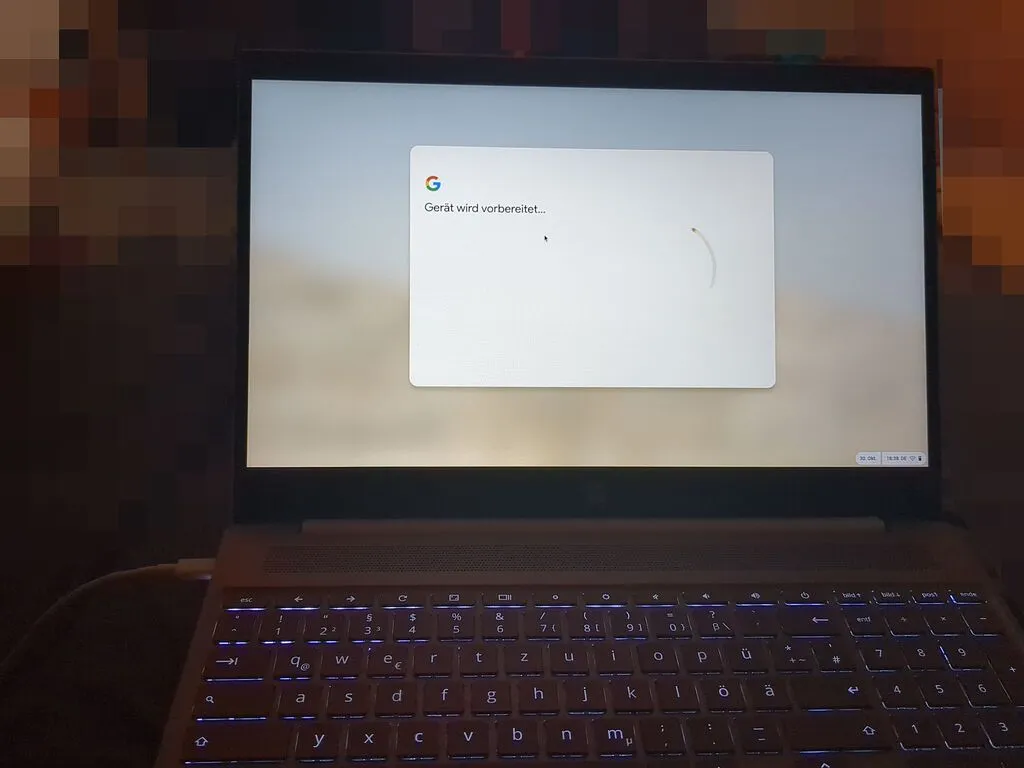
The CPU is quite old and the ports are horrendous.
But that machine has a crazy screen, pretty nice keyboard (actually my first laptop with a numpad ever) and the fan is really silent.
And the install was very easy. Now runs Fedora Kinoite!
Chromebooks, with Linux, not just ChromeOS (the batterylife difference is tiny) are really great for simple office stuff and even media consumption, while being efficient.
My main, 11in Lenovo Chromebook just lost 30% batterylife over a course of 4 hours or more. And it costed 140€!
Boo! Making Your Ubuntu Linux Desktop Halloween Ready

YouTube Video
Click to view this content.
MullvadVPN Tricks: Making MullvadVPN work better on GNU/Linux
Making MullvadVPN work better on GNU/Linux. Contribute to boredsquirrel/MullvadVPN-Tricks development by creating an account on GitHub.
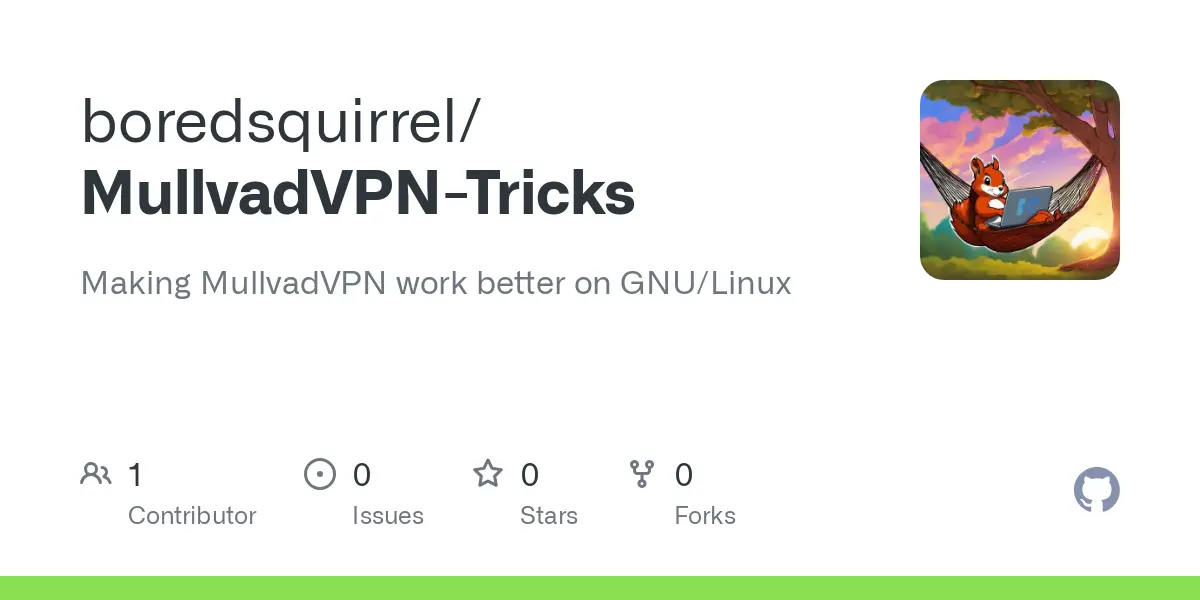
Just made a dedicated repo about a bunch of tricks I regularly use.
A KDE Plasmoid is definetly missing on that list. Having it work without garbage Electron, at least most of the time, is crucial.



